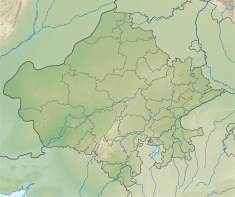Mansi Wakal Dam
| Mansi Wakal Dam | |
|---|---|
| Country | India |
| Location | Jhadol tehsil, Rajasthan |
| Coordinates | 24°28′35″N 73°29′17″E / 24.476518°N 73.487928°E |
| Construction began | 2000[1] |
| Opening date | 2005[2] |
| Construction cost | ₹60 crore (US$7.2 million)[3] |
| Dam and spillways | |
| Impounds | Mansi River |
| Reservoir | |
| Active capacity | 24,400,000 m3 (19,781 acre⋅ft)[4] |
Mansi Wakal is a dam on the Mansi River in Udaipur district, Rajasthan, India.
Located approximately 7 kilometres north of the village of Jhadol[5], the dam forms a reservoir which can hold about 24.4 million cubic metres of water.[4] The reservoir primarily provides drinking water to the city of Udaipur[6], accounting for 23% of the city's drinking water supply.[7] Additionally, the reservoir supplies drinking water to rural areas of Udaipur district[3] and water for industrial uses to Hindustan Zinc.[8]
Mansi Wakal dam is part of an inter-basin transfer scheme called 'Mansi Wakal I' under which water is transferred from the Sabarmati basin to the Bherach basin.[2] The dam was constructed between 2000[1]-2005[2] by the Government of Rajasthan at a cost of ₹60 crore (US$7.2 million)[3] with monetary contributions from Hindustan Zinc in the ratio of 70:30.[8] Some local groups opposed the construction of the dam.[9][10]
References
- ^ a b Project Information Memorandum (PDF). Udaipur Smart City Limited. 2017. Retrieved 4 May 2019.
- ^ a b c Mehta, Anil (2009). Ecotechnological Management and Operation of Selected Surface Reservoirs of Upper Berach Basin, Udaipur. Udaipur: Maharana Pratap University of Agriculture & Technology. Retrieved 4 May 2019.
- ^ a b c Rao, Surendra Singh (16 December 2018). "60 crore ki laagat se 2006 mein Rajasthan mein bana yeh bandh charcha mein kyon hai". Patrika. Retrieved 4 May 2019.
- ^ a b Monsoon 2014. Jaipur: Government of Rajasthan. 2014. Retrieved 3 May 2019.
- ^ "Bhuvan-2D". Bhuvan Indian Geoplatform of ISRO. National Remote Sensing Centre. Retrieved 4 May 2019.
- ^ Rajasthan Development Report. Planning Commission of India. 2006. Retrieved 3 May 2019.
- ^ Understanding water flows in Udaipur. Heinrich Böll Foundation-India & Development Alternatives. 2018. Retrieved 4 May 2019.
- ^ a b Vedanta Resources PLC Annual Report 2006 (PDF). Vedanta. Retrieved 3 May 2019.
- ^ Kumar, Shailendra (4 July 2015). "Tribals demand scrapping of proposed dam". Down to Earth. Retrieved 3 May 2019.
- ^ Sahoo, Sarbeswar (2013). Civil society and democratization in India. Oxon: Routledge. Retrieved 4 May 2019.


